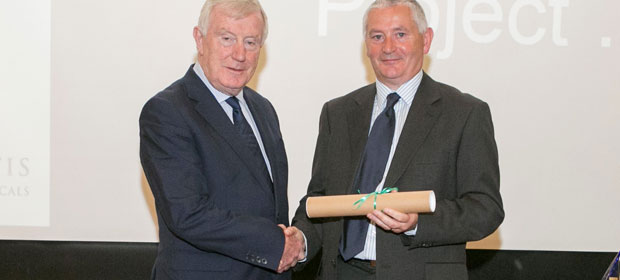In 2012 WALK, a community and voluntary organisation supporting adults with intellectual disabilities, wanted to find a way to ensure that its values were reflected in the everyday actions of its staff, writes Austin O’Sullivan.

HMI Leaders Award Judges commended WALK which was one of the regional finalists in the Award.
Values form the foundation for everything that happens in the workplace. An organisation’s values will largely govern, and be reflected in, the attitudes and actions of its staff. WALK has always had two core values. Human rights based service delivery and a low arousal, non aversive, approach to supporting people whose behaviours can challenge.
We wanted to ensure that WALK’s culture reflected these values, to find a way to embed them in everyday practice. Culture is made up of the values, beliefs, underlying assumptions, attitudes, and behaviours shared by a group of people. It is what you do every day.
WALK created a number of project teams comprising of 42 staff representing a cross section of the organisation. These teams worked together over an eighteen month period.
First, they worked to explicitly state the following for WALK:
- The values
- The culture WALK wanted to create
- The expected behaviours that underpinned these values
The project teams then developed a framework identifying six core, and six role-specific, competencies designed to underpin the organisation’s culture.
The final part of the project was to set up systems to embed these competencies, building a culture where all staff behaviour is in line with WALK’s values.
Performance Development System
A Performance Development System (PDS) incorporating the six competencies was developed. This system was piloted in four teams over a six month period. The pilot led to some revisions to the framework and then an organisation wide implementation plan led by the Learning and Development and Quality teams.
The PDS provides for biannual review meetings with ten shorter monthly supervision meetings between a staff member and their line manager. It addresses four areas:
- Review of Outcomes achieved in the previous period and goals set for the next period;
- Behaviours demonstrated in the previous period against the competency areas, and, areas for development;
- Training completed in the previous period, its impact on performance and training planned for the next six months;
- Career Development vertically and horizontally in WALK.
Ensuring new recruits matched our values
The new framework enabled WALK move to a competency-based interview system. Interviews contain a section on values drawn from the framework. Candidates are assessed on how well their behaviour in previous roles fit with our values.
Identifying quality systems to underpin this culture.
The PDS system is the quality tool that we use to measure our adherence to our values. It allows for the standard quality cycle of ‘Plan, do, check, act’ to be implemented for each staff member within their role. The Human Resources and Quality Departments perform regular internal audits to ensure that the system is being used correctly and to a high standard.
Implementation of the project has resulted in the following benefits:
- WALK’s Strategic Plan, developed since the project’s inception, is fully grounded in the identified six core values.
- Staff demonstrate and model the values in their work behaviours, decision making and interpersonal interactions.
- Managers report it is much easier to have conversations about staff behaviour because they can reference the framework as the expected standard.
- Organisational values guide each staff’s priorities in their daily work life.
- Values guide every decision that is made in the organisation.
- Rewards and recognition within the organisation are structured to recognise those people whose work embodies the values the organisation embrace.
- People are hired and promoted based on their actions being congruent with WALK’s values.
It would be foolhardy to think that any organisational practice can negate the possibility of isolated incidents such as the inhuman and repulsive events highlighted in the Aras Attracta investigation. However, a human rights based values culture will certainly minimise the chance they will happen. Such a culture needs to be led from the top and built from the ground up. It begins at recruitment and remains a constant throughout a person’s career. It is not solely the domain of direct support staff. It is the domain of everyone. It should be reflected in the organisation’s strategic plans as much as it should in day to day support.
Organisations are not static things. They develop, change, adapt and grow over time. Growth requires a strong foundation if it is to be done in the right way. A building will collapse if it does not have strong foundations. Working with vulnerable adults means the right way is the only way. To do otherwise would be negligent at best, abusive at worst. WALK’s values based culture is its foundation. The key to ensuring that everything we do, at all levels, both now and in the future is done in the right way.

